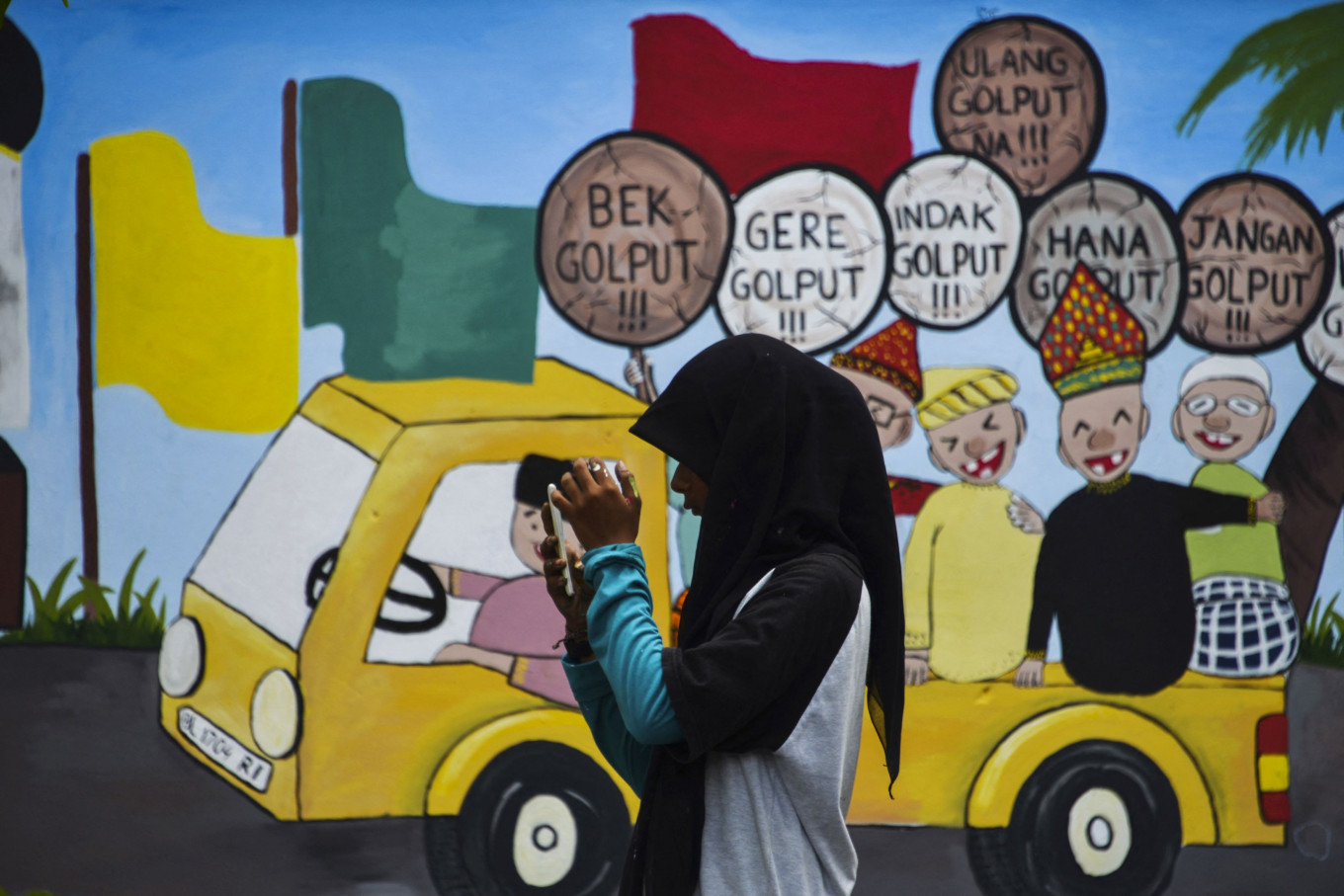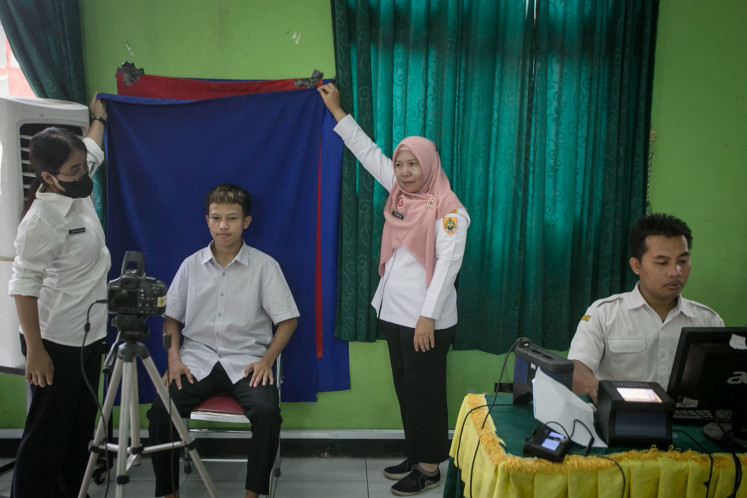Popular Reads
Top Results
Can't find what you're looking for?
View all search resultsPopular Reads
Top Results
Can't find what you're looking for?
View all search resultsWho to choose? First-time voters gearing up for 2024 election
Many first-time Indonesian voters have started to think about who to vote for in the 2024 presidential election.
Change text size
Gift Premium Articles
to Anyone
A
head of the 2024 election, a generation of Indonesians who have reached the required age will be on the front lines with their ballots, exercising their right to vote for the very first time. In fact, a Centre for Strategic and International Studies (CSIS) survey released in September last year estimated that Gen-Zers and millennials, those ranging from age 17 to 39, will make up nearly 60 percent of voters in 2024.
These young voters include a sizable pool of first-time voters, who will range between age 17 and 21 in 2024. Many of them were in junior and senior high schools when the 2019 election kicked off, watching from the sidelines during the heat of that contest.
And with the 2024 election nearing, are they finally ready to make their voices heard?
“I don’t know much about electoral politics since I haven’t been following a lot for next year,” Azzahra “Ara” Farhani Rachmadewi, 17, told The Jakarta Post on May 23.
However, the student of SMA 9 state senior high school in Bandung, West Java, has not necessarily tuned out the news. She is still waiting for the candidates’ campaigns to begin.
“I want to get to know first their steps and actions to gain my and other people’s interest,” she said.
Population and Civil Registration officers at Sragen, Central Java, take a photo of a student for an identification card at SMK 1 vocational school in Sragen on May 24, 2023. The General Election Commission (KPU) estimated that around 110 million young people, or about 60 percent of total voters, ranging between the ages of 17 and 40, will dominate the 2024 elections. (Antara/Mohammad Ayudha)Interest in politics (or lack thereof)
Like Ara, other first-time voters are still waiting for the presidential candidates to share their visions for the country on-screen.
“I’ve yet to lean toward any choices yet. I’m still waiting for their debates so I can see their take on national issues,” Muhammad Rizki “Wira” Wiratama, 20 told the Post on May 24.
Already in his fourth semester at Telkom University in Bandung, Wira has noticed that conversations about voting are starting to occur among his university friends, albeit not with any intensity.
“It’s just been a passed-on question of ‘Have you decided on who to choose?’ since my age group finally got the vote,” he said.
Wira will often absorb information on politics through news articles and social media, following cases of corruption and other issues, including Indonesia’s disappointing loss of the right to host and play in the FIFA U-20 World Cup soccer tournament this year.
“I followed Erick Thohir’s effort for a final plea to FIFA, and there was talk about him possibly being a candidate for vice president,” Wira said about the Soccer Association of Indonesia (PSSI) chairman’s moves.
“I also quite like his leadership. Prior to this, he’s had a good track record as the state-owned enterprises minister,” he added.
Meanwhile, Wira’s university friend Yaffazka Afazillah Wijaya has simply looked into the issues that have become hot topics among his friends. Yaffa’s biggest worry is falling for “biased” information that favors a certain candidate.
“I just do my own research using trusted sources,” said the 19-year-old from Subang, West Java, trying to cross-check on the internet anything he hears from his peers.
Russian Literature student Tesya Madina prepares to dive deeper into political issues that can help her vote wisely in the 2024 election. (Tesya Madina/-)For 20-year-old Russian Literature student Tesya Madina, talk of elections is already heating up within the student executive board (BEM) of the Cultural Sciences Faculty at Padjadjaran University, of which she is a member.
“There is talk of it already among the BEM, but because I’m not that interested in it, I’m not aware of much. Even when I read some stuff, it’s just a glance,” Tesya told the Post on May 24.
Family influence
Like a lot of first-time voters, Tesya and others are aware of their families’ political leanings, even their parents’ choices during the divisive 2014 and 2019 elections.
“In my family, it’s already apparent which candidate we’ll choose because there is a supposed belief in a particular party, regardless of the candidate,” Yaffa shared, adding that his mother has a tendency toward the Golkar Party. “But I haven’t decided on anyone yet.”
Thankfully, his parents would rather “avoid conflict”.
“Political conversations within my family are never that intense, my parents see it as something that doesn’t need arguing about,” he said.
Ara, meanwhile, had dinner table conversations with her family after the Indonesian Democratic Party of Struggle (PDI-P) chairwoman Megawati Soekarnoputri endorsed Central Java Governor Ganjar Pranowo as its presidential candidate.
“We all talked about how Pak Ganjar could be a good leader, but we’re still seeking other information and seeing other people’s perspectives on him,” she said, keen to know more about the other candidates.
But for 18-year-old student Lynea Mayo, she is adamant on sticking only to her choices.
“I listen to a lot of talk on politics in my family, but we also have differing opinions on it,” Mayo told the Post on May 26. “So I won’t entirely follow my family’s choice for next year’s election, I’ll just vote for who I think is best.”
Seeking information
What unites them, regardless of their political interests, is the will to dig for more background on issues so as to make an informed vote.
“Sometimes I see some [discourses] on Twitter and Instagram, and they’re very helpful,” Tesya said.
Mayo, who is not into politics, also said that she and her friends would still vote as this would be their first time.
“They care about elections and politics in general, and we plan to look further into the official candidates,” she said.
This interest is what has called into being the Bijak Memilih (Choosing Wisely) platform by local think tanks Think Policy and What Is Up, Indonesia?, both of which focus on political awareness on younger generations. The online platform, with its sleek interface and accessible language, provides an easy-to-digest guide and explanation on issues a voter might care about, and the site shows on which side of the issue each party stands.
“Many of us felt like we were still confused about the political process: If I care about such and such an issue, where do these parties stand on all this? And there was no readily available and easily accessible info on the matter,” the platform’s cofounder Andhyta F. Utami told the Post on May 25.
As the founder and CEO of Think Policy, Andhyta also shared how she and What Is Up, Indonesia? cofounder Abigail Limuria received many messages on social media from concerned users wishing to know more about the election and all things politics, now that 2024 is getting nearer.
Andhyta shared how they eventually made the platform with two “personas” in mind, millennials with jobs and kids who have no time on their hands to scour for information by themselves, and Gen-Z students who still need a more in-depth understanding of politics.
“So far we’ve only been exposed to early adopters, but the reception has been really great,” Andhyta said. “The next challenge is to reach the masses,” she added, preparing for Bijak Memilih’s second and third phases, which will focus on political parties and presidential candidates.
This kind of platform is one of the tools that first-time voters can use, many of whom are eager to learn more.
“Even though I’m not that interested [in elections], I feel like it’s very important for us to understand since it will affect us all,” Tesya said. “I hope I can use my voting rights wisely.”












